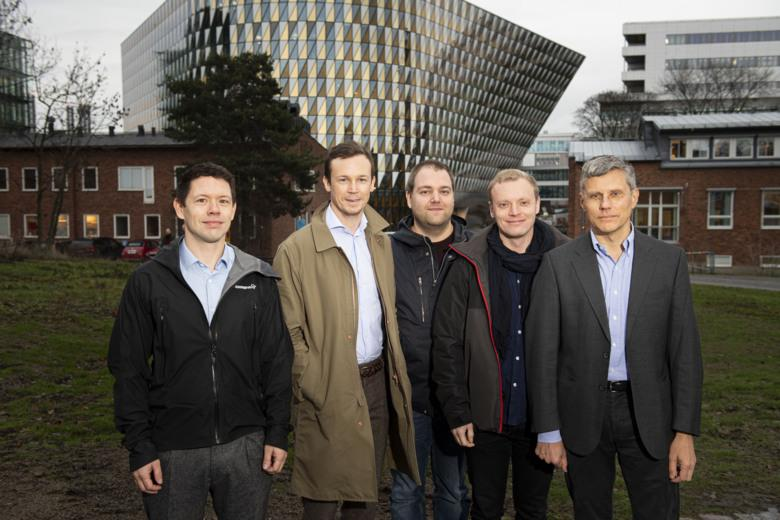Jan 9 2020
An artificial intelligence-based technique for histopathological diagnosis and grading of prostate cancer has been devised by scientists from Karolinska Institutet. The AI system overcomes one of the drawbacks in the existing prostate cancer histopathology, by offering more accurate diagnosis and better treatment decisions.
 From left: Peter Ström, Martin Eklund, Kimmo Kartasalo, Henrik Olsson och Lars Egevad, researchers at Karolinska Institutet. Image Credit: Stefan Zimmerman.
From left: Peter Ström, Martin Eklund, Kimmo Kartasalo, Henrik Olsson och Lars Egevad, researchers at Karolinska Institutet. Image Credit: Stefan Zimmerman.
The study has been reported in The Lancet Oncology and demonstrates that the AI system is as accurate at detecting and grading prostate cancer, as renowned uro-pathologists.
Our results show that it is possible to train an AI-system to detect and grade prostate cancer on the same level as leading experts. This has the potential to significantly reduce the workload of uro-pathologists and allow them to focus on the most difficult cases.
Martin Eklund, Associate Professor, Department of Medical Epidemiology and Biostatistics, Karolinska Institutet
Eklund is the lead author of the study. The main disadvantage in the existing prostate pathology is that there is a specific degree of subjectivity in the evaluations of the biopsies. Various pathologists may come to different conclusions, despite analyzing the same samples.
This results in a clinical problem since doctors have to choose the treatment based on ambiguous information. In this regard, the scientists see considerable potential to employ the AI technology to enhance the reproducibility of pathological evaluations.
The researchers trained and tested the AI system by digitizing over 8,000 biopsies obtained from nearly 1,200 Swedish men aged between 50 and 69 years, to high-resolution images, with the help of digital pathology scanners. They used almost 6,600 samples to train the AI system to identify the difference between biopsies with or without cancer.
The AI system was then tested using the remaining samples, along with more sets of samples obtained from other labs. The results of the system were furthered compared with the evaluations of 23 renowned uro-pathologists. The research was carried out in collaboration with scientists at Tampere University, Finland.
Near-Perfect Detection
The study outcomes revealed that the AI system was virtually near-perfect in identifying whether or not a sample had cancer, and also in predicting the cancer tumor length in the biopsy. The AI system matched the skills of the international experts in terms of determining the prostate cancer severity, or what is known as the Gleason score.
When it comes to grading the severity of the prostate cancer, the AI is in the same range as international experts, which is very impressive, and when it comes to diagnostics, to determine whether or not it is cancer, the AI is simply outstanding.
Lars Egevad, Study Co-Author and Professor in Pathology, Karolinska Institutet
Pan-European Validation Study Underway
Although the preliminary outcomes of the study are promising, further validation is required before the AI system can be widely used in clinical practice, say researchers. To ensure this, a multicenter study involving nine European countries is in progress at present and said to be concluded by the end of 2020.
The aim of the study is to train the AI system to identify cancer in biopsies obtained from various laboratories, with extremely rare growth patterns, using different types of digital scanners. Moreover, a randomized study to begin in 2020, will investigate ways to implement the AI model in Sweden’s health care system.
AI-based evaluation of prostate cancer biopsies could revolutionize future health care. It has the potential to improve the diagnostic quality, and thereby secure a more equitable care at a lower cost.
Henrik Grönberg, Professor in Cancer Epidemiology, Karolinska Institutet
Grönberg is also the head of the Prostate Cancer Center at Saint Göran Hospital in Stockholm.
“The idea is not that AI should replace the human involvement, but rather act as a safety net to ensure that pathologists don’t miss some cancers, and assist in standardization of grading,” stated Martin Eklund. “It could also serve as an alternative in parts of the world where there is a complete lack of pathological expertise today.”
The research was financially supported by the Swedish Research Council, Swedish Cancer Society, Swedish Research Council for Health, Working Life, and Welfare (FORTE), Swedish eScience Research Center, Academy of Finland, Cancer Society of Finland, Emil Aaltonen Foundation, Finnish Foundation for Technology Promotion, Industrial Research Fund of Tampere University of Technology.
Funding was also provided by KAUTE Foundation, Orion Research Foundation, Svenska Tekniska Vetenskapsakademien i Finland, Tampere University Foundation, Tampere University graduate school, The Finnish Society of Information Technology and Electronics, TUT on World Tour programme, and the European Research Council.